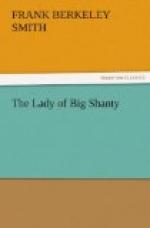“God knows!” he burst out, “I have no right to talk to you. I’ve tried not to, but I must tell you.”
“Don’t, Billy—don’t!” she sobbed, and she looked into his eyes through her tears, her limp form in the coarse ulster swaying as if she was about to faint.
He felt the hot tears strike his hand; saw the dim wonder in her eyes. Then slowly, still trembling, she sank in his arms.
“And I love you too, Billy,” she breathed as she yielded her lips. “I love you with all my heart—with all my soul!”
None of these happenings did they ever breathe to Alice—time enough for that when the fear that haunted them all had passed. The mother had looked at them both in wonder when the two fell into line again, noting the new spring in their steps and the glad light in the girl’s eyes, but she made no comment.
They had now reached a desolate region of oozy moss and dead trees; here they camped for the second night. It was a place even a hungry lynx would have avoided. The stillness was oppressive—a silence that one could hear. Before it grew quite dark this audible hush was twice broken by the plaintive note of a hermit thrush—a bird so shy that he leaves his mate, seeking his hermitage among forgotten places. The place was inanimate—dead like the trees—their skeletons rising weirdly from the spongy moss.
The moon rose at length, seemingly shedding its light over the desolate spot out of pity. Again Alice Thayor lay awake until long past midnight. The very desolation fascinated her. Again she thought of Sperry, and again her face flamed with indignation—in fact, he had seldom been clear of her mind, try as she might to banish him. She wondered if he would have roughed it with the grit her husband had shown. Not once had Sam complained. This, in itself, was a revelation—she who had dared to complain of everything that thwarted her comfort or her plans. Nor had he once failed in all the hours of their long tramp to look after her comfort as best he could. With all this his heavy pack had been badly balanced, so much so that he had been obliged to stop now and then to re-pad the ropes cutting under his armpits with moss—Holcomb helping him—the straps rescued from three charred pack-baskets being reserved for the heavier loads of the Clown, the trapper, and Holcomb.
As these things developed in her mind another feeling arose in her heart: a feeling of pride in the man trudging on ahead of her—pride in his pluck, in his patience, in his cheeriness, and last, in his bodily strength, for to her great surprise her husband proved to be stronger than Blakeman and the match of Holcomb. She had not believed this possible.
At dawn she fell asleep, awaking with a violent headache. She felt as if she had been beaten; every bone in her body ached; her cheeks were burning; her hands were like ice. She shuddered now in a chill, yet she crawled deeper into her blanket and called no one. All through the cold of the early dawn she suffered intensely—shivering with cold and burning with fever, by turns. She dare not move lest she might wake Margaret or Sam. Toward morning her legs grew warm; the old dog had lain across them. Then she fell into a troubled sleep.




